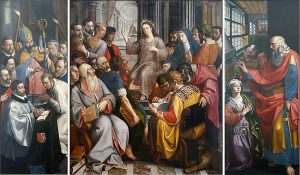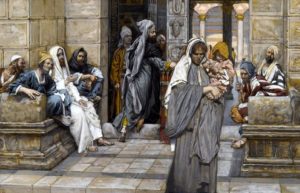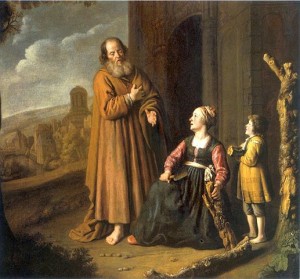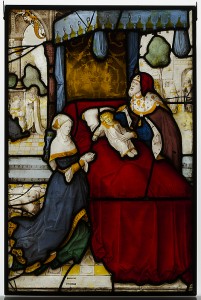Thoughts on Sunday’s Lessons for Nov. 3, 2024 (Pentecost 24B/Proper 26)

Christ Among the Scribes (1587), triptych by Frans Francken I (1542-1616). Cathedral of our Lady, Antwerp, Belgium. (Click image to enlarge.)
First Reading (Track One): Ruth 1:1-18
In the midst of the Hebrew Bible’s books that tell the stories of Israel and its kingdom, tucked in between Joshua and Judges, Samuel and Kings, we find the short, charming book of Ruth. These opening verses tell a love story about Ruth, a young Moabite widow, who follows her beloved mother-in-law, Naomi, back home to Bethlehem after Ruth’s husband’s death. In today’s verses – a passage often chosen for use in weddings – we hear Ruth promise Naomi that she will loyally stay with her: “Where you go, I will go; you lodge, I will lodge; your people shall be my people, and your God my God.”
First Reading (Track Two): Deuteronomy 6:1-9
Foreshadowing Sunday’s Gospel, our Track Two second reading tells of Moses giving the people the Shema, the short prayer that is central to Jewish worship in Jesus’ time and on to today: “Hear, O Israel: The Lord is our God, the Lord alone. You shall love the Lord your God with all your heart, and with all your soul, and with all your might.” God commanded that the people keep this prayers in their hearts, teach it to their children, bind it to their hands and foreheads, and fix it on their doorposts.
Psalm (Track One): Psalm 146
Singing the praise of God who cares for God’s people and loves us deeply, the Psalmist calls us to look beyond earthly rulers, who cannot help us in the long run. Rather, place our hope in God, creator of the earth and all that is in it, who reigns forever, the Psalmist sings. God’s caring justice favors the poor and the oppressed, those most in need: Hungry people, prisoners. those who are blind; the stranger, the widow, the orphan; those weighed down by life’s load. In caring for the least among us, as Jesus would later call on us to do, God cares for us all.
Psalm (Track Two): Psalm 119:1-8
Psalm 119, the longest of all the Psalms, devotes all its 176 verses to a consistent message: God’s decrees, God’s law and teaching given in the Torah, are wonderful, and following them makes us happy. The ideas that we hear today in the first eight verses of the Psalm continue throughout, and they echo the covenant between God and Moses at Mount Sinai: Those who follow God’s teaching and walk in God’s ways will be rewarded. Keep us steadfast in following this teaching, the Psalmist prays, asking in turn not to be forsaken.
Second Reading: Hebrews 9:11-14
We continue reading in the letter to the Hebrews, and the author is sticking with the theme we heard in last week’s passage: In his effort to bring backsliding Jewish converts back to the infant church, the author of Hebrews continues to lift up Jesus as a great high priest superior to the old high priests of the Temple. Jesus serves as priest in a perfect tent that is not part of this creation, we are told; he entered the Holy Place not through the blood sacrifice of goats and calves but with his own blood. Through this sacrifice, we are told, we all are purified in body and soul.
Gospel: Mark 12:28-34
A lot has happened since we left Jesus with the no longer blind Bartimaeus in Jericho last Sunday. We have skipped over Jesus’ entry into Jerusalem amid waving palms and high hosannas; Jesus has overturned the money changers’ tables and gotten into several arguments with the Scribes and Pharisees, who have started plotting to kill Jesus. But now another kind of scribe emerges. This scribe approaches Jesus kindly and asks him to name the greatest commandment. Jesus replies, as a proper rabbi should, with the Shema. Then he adds a second: “You shall love your neighbor as yourself.” The scribe agrees, adding that all this is greater than burnt offerings and sacrifices.



 First Reading:
First Reading: